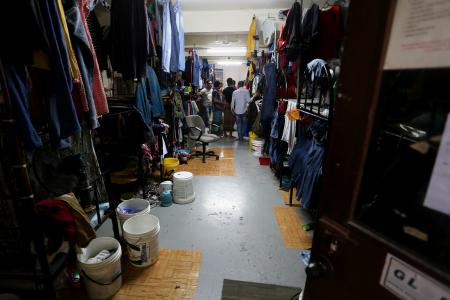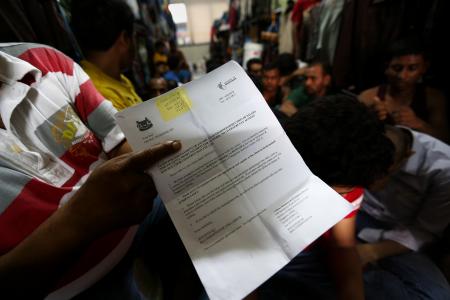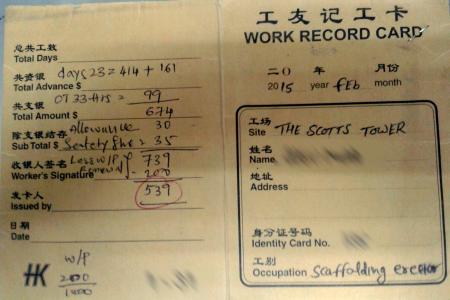No money, no food, how to work? Ask workers at Kranji Loop dormitory
Construction workers claim they have not been paid for 2½ months
Looking tired, hungry and frustrated, they appeared an odd bunch.
It was a work day and instead of being out at construction sites, the group of 29 Bangladeshi workers were just milling about the entrance of their Kranji Loop dormitory.
Since last Monday, the workers, who were supposed to be working at a number of project sites in Sakra Island, which is part of Jurong Island, Tuas and Beach Road had refused to go to work.
Their duties include panel installation, cementing and welding.
They claimed they had not been paid for 2½ months, their pay was being docked illegally and they were running out of money to pay for food.
Their employer claims he had settled the matter with them.
But the Ministry of Manpower (MOM) has deemed it serious enough to investigate the workers' claims.
Last Wednesday, The New Paper team noticed the workers loitering near the entrance of their dormitory at 5 Kranji Loop, which was within an industrial estate.
They invited us into their dorm.
Aged between 24 and 47,, they said they were working for Kim Hup Chor Construction and were supposed to be working at a few locations around the island.
They told TNP that not only had they not been paid for 2½ months, their meals supplier, who wanted to be known only as Mr Aynal, who is also from Bangladesh, had stopped providing them food that very morning.
The workers said they have been unable to pay him the $120 per person monthly fee for two months. He delivers packed food for breakfast, lunch and dinner.
Initially, Mr Aynal provided food without payment, but on Wednesday morning, the meals stopped coming.
One of the workers, who gave his name only as Mr Abdul, claimed: "How to pay for makan (Malay for food) when our company owes us more than two months' salary?
"We have all borrowed from relatives working in Singapore. But they, too, have families to support."
Thankfully, the workers found some relief that same day. They said they were each given $300 by their employer for food expenses, so meals resumed the next day.
On Wednesday, the workers had to buy their own food with whatever little money they had.
Mr Aynal later told TNP: "I almost had to stop (helping) them because I couldn't afford it any more."
The workers live in a 15m by 6m room - about the size of a badminton court - meant for 40 people located within the premises of a workshop.
They said their problems started when their employer stopped paying them from March 1.
Last Monday, the workers, who include welders and brick layers, went to MOM to lodge their complaints.
On a document shown to this reporter, they listed non-payment of salary, unauthorised deductions and short payment of overtime work.
The next day, when company directorLim Beng Kiat met the workers at their dormitory, a shouting match apparently erupted.
The commotion was recorded by a worker on his mobile phone.
In the recording, one worker is heard telling Mr Lim that they would return to work only if their outstanding salaries were paid.
Mr Lim then replies: "So now you know how to threaten me lah?"
The worker vehemently denies this.
Mr Lim is then heard saying: "So this is how you all treat me? I understand... I can settle your salary. But you all next time got problem, don't come and talk to me."
He loses his cool again after another worker says he is facing financial problems.
Mr Lim then shouts: "Everybody got problem. Now the company got problem!"
Coincidentally, an MOM officer called Mr Lim on his mobile phone while he was at that meeting.
Mr Lim answered the call and let his employees listen to the conversation.
In the recording, he admits to the officer that he had delayed the workers' salaries by two months.
He also says the deductions from his workers' pay were due to loans the men had taken from the company.
But many workers we spoke to denied taking these loans.
A worker, who gave his name only as Mr Mohamad, showed us a copy of his salary record card which indicated that a $200 deduction had been made. Beside the entry, there was a handwritten note saying "less W/P renewal".
Mr Mohamad said: "Close to 30 families back home (in Bangladesh) are made to suffer because we cannot send back money.
"Many of us have taken loans to come to Singapore and have family expenditures to pay for in Bangladesh."
When contacted on Thursday evening, Mr Lim claimed the matter had been settled.
He also claimed he had been visiting the workers each day to coax them to return to work.
He added: "We already settled with them today. They are now ready to work."
When TNP checked with two disgruntled workers on Thursday night, they said the matter was far from resolved.
One of them, who gave his name only as Mr Hossian, said they would be going to MOM with Mr Lim on May 28. And that if their salaries are not paid, they would not return to work.
So this is how you all treat me?...I can settle your salary. But you all next time got problem, don't come and talk to me.
- Mr Lim Beng Kiat, in a recording by a worker
We already settled with them (the workers) today. They are now ready to work.
- Kim Hup Chor Construction company director Lim Beng Kiat on Thursday. When we spoke with two workers the same night, they said the matter was far from resolved
We have all borrowed from relatives working in Singapore. But they, too, have families to support.
- One of the workers, who gave his name only as Mr Abdul
MINISTRY LOOKING INTO WORKERS' CLAIMS
The Ministry of Manpower told The New Paper it was looking into the Bangladeshi workers' claims.
It stressed that employers have a legal and moral responsibility to ensure that workers' salaries are paid on time.
An MOM spokesman said: "The Ministry of Manpower has reminded the employer of his responsibility to provide accommodation and upkeep to the workers, while investigations into the non-payment of salaries, kickbacks, and housing the workers in premises that do not comply with the relevant standards, are ongoing."
MOM added it was ready to render assistance if the employer is unable to maintain the workers' upkeep.
In 2014, 645 employers were taken to task by MOM for failing to pay workers their salaries.
Out of these, 49 employers were taken to court, while the rest were given warning letters or advisories, according to a report earlier this month in The Straits Times.
Under the law, employers who fail to pay workers' salaries or house them in acceptable accommodations can be fined up to $10,000 and jailed up to 12 months for each offence.
Get The New Paper on your phone with the free TNP app. Download from the Apple App Store or Google Play Store now






